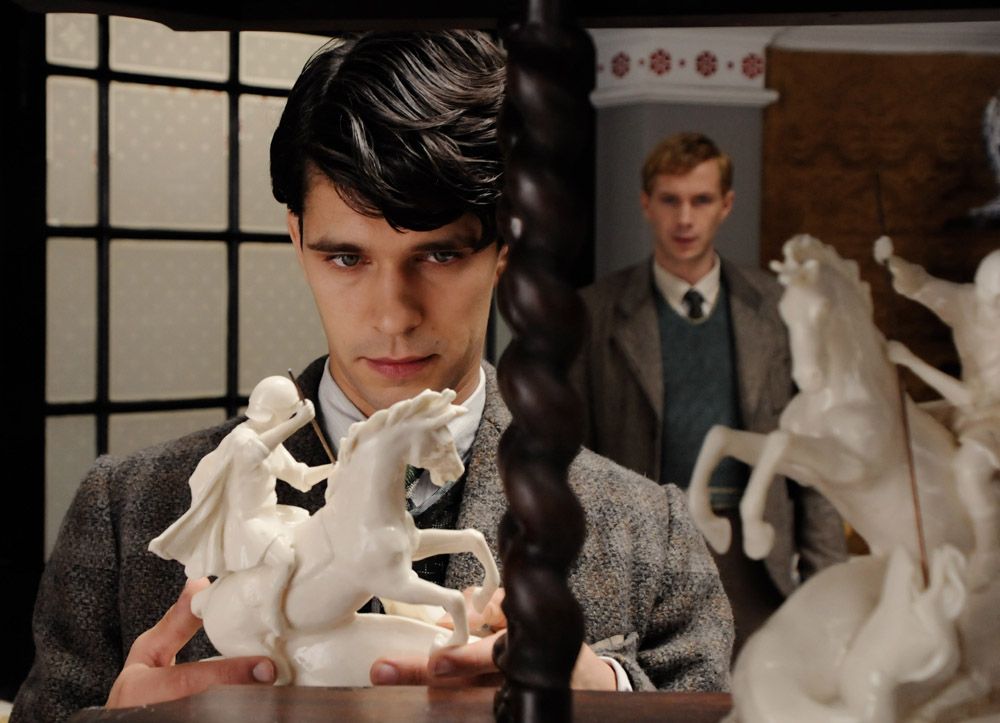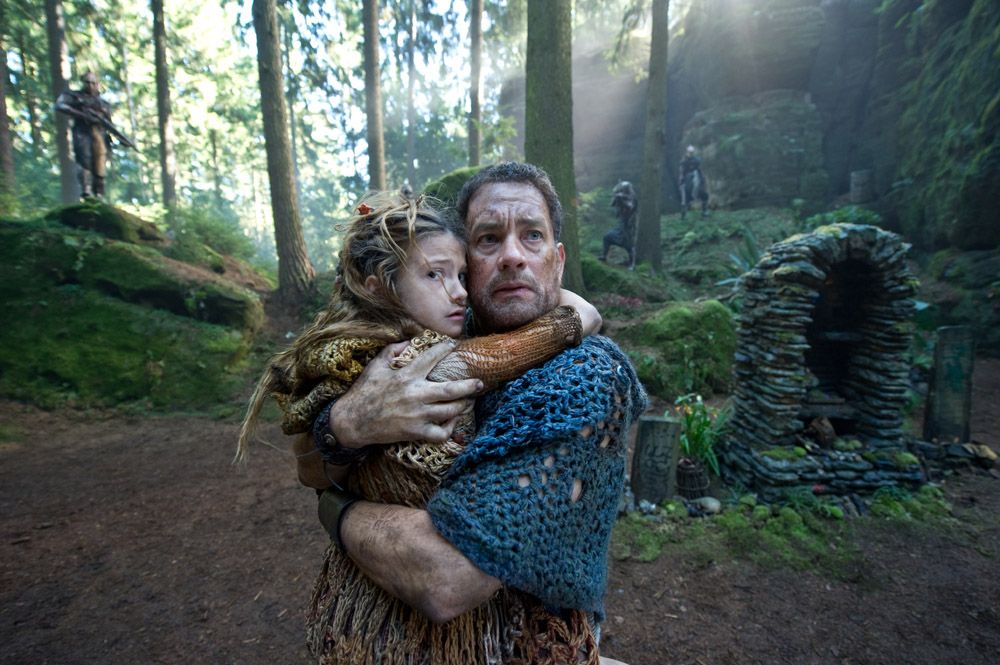Never has a film defied my expectations like Cloud Atlas. Directors Tom Tykwer and Lana and Andy Wachowski have transformed a cold, disjointed novel into a meaningful, moving and deeply personal tribute to the human spirit. It is, without a doubt, the most unique commercial release you'll see this year – and the most challenging.
As you've already ascertained, I'm not a fan of David Mitchell's 2004 novel of the same name. I read it in anticipation of seeing the film, and my disappointment regarding its dry, calculated, alienating approach to admittedly fascinating subject matter tempered my excitement for the adaptation to the point of apathy. It turns out this was the perfect way to approach Tykwer and the Wachowskis’ movie, because, while Cloud Atlas borrows many of the novel's lines verbatim, it is also the best example I’ve ever encountered of rearranging, reinterpreting and infusing meaning into source material. Where the book separates all six stories, brusquely hints at connections threaded throughout and challenges the reader with complicated dialogue (often to the point of distraction), the filmmakers employ an almost scientific level of understanding to the text – cross-cutting tales, overlapping voiceover into separate scenes and, most notably, having their actors swap gender and race roles across time periods to underscore the tale's message.
If you're one of the many who still can't wrap your head around the Cloud Atlas trailers, know that the film will unfurl and reveal itself in a very deliberately paced (but never tedious) fashion, but it will not hold your hand. Your questions will be answered, but new ones will be posed in their place. Themes of reincarnation, fate, karma, spirituality and responsibility are the heart of this film, and it's hard to shake the feeling that the tale is being portrayed at exactly the right time in our history. Cloud Atlas is also an incredible visual exercise, an inundation of futuristic landscapes, post-apocalyptic worlds, long-gone pasts and unimaginable presents, each portion epically realized, detailed, imaginative and completely engrossing – enveloping both its characters and audience in its spell.
We're invited onto the choppy Pacific Ocean voyage of notary Adam Ewing (Jim Sturgess) in 1849, we're witness to letters between musician Robert Frobisher (Ben Whishaw) and his lover Rufus Sixsmith (James D'Arcy), we follow intrepid reporter Louisa Rey (Halle Berry) in 1975 San Francisco as she investigates a cover-up involving a nuclear power plant, we're embroiled in the unintentionally hilarious ordeal of elderly publisher Timothy Cavendish (Jim Broadbent), we enter Neo Seoul in 2144 and follow the plight of a genetically engineered fabricant named Sonmi 451 (Doona Bae), and we're enveloped in the landscape of post-apocalyptic Hawaii with Zachry Bailey (Tom Hanks) and his tribesmen. The Wachowskis helmed the Pacific Ocean voyage, Neo Soul and Hawaii portions, while Tykwer directed Frobisher, Rey and Cavendish's tales, a fitting balance, with each filmmaker infusing his or her strengths into the material.
Where the novel's separate tales are long and rambling, none of the film's scenes lasts more than 10 or 20 minutes, allowing us to slide into the different time periods and plights but also to understand how these strangers connect through the ages. All of the players in each narrative show up in various forms throughout the other stories, making Cloud Atlas something of a Where's Waldo with its cast, often covered with make-up or prosthetics, but always ever-so-slightly recognizable.
Much has been said about the film's use of make-up (specifically the “Asian-ization” of white actors), and I'd tend to agree that it doesn't look as polished and believable as it should, but the meaning is there: All of these faces are meant to be transformed but still recognizable, allowing the audience to connect the dots of how the characters relate to one another throughout time. And Tykwer and the Wachowskis are equal opportunity when it comes to swapping race and gender among their actors; as far as I'm concerned, there is no offense given or implied. The film acts as its own argument for these decisions.
Tykwer’s Cavendish portion is an immediate stand-out – uproariously funny, Broadbent absolutely steals the show. It also includes a hilarious turn by Hanks as Dermot Hoggins, a trash-talking, loose-cannon, failed author with epic facial hair at Cavendish's publishing house. Surprisingly emotional and riveting, the Wachowskis’ Neo Seoul tale is more than simply visually rich; the relationship between Sonmi 451 and her savior Hae-Joo Chang (Sturgess) is rife with chemistry and romance. In that vein, Sturgess really ups his game in this film. Among a cast of formidable actors, he runs with his roles and tackles both their physical and emotional heft with grace and charm. I was incredibly skeptical about Hanks' casting (specifically when it came to playing a teenage tribesman in the Hawaii portion), but – as only the inimitable Hanks can do – he sells it all, even the futuristic language that many find a bit silly. (Frankly, I bought it. I liken it to performing Shakespeare. The actors understood the meaning, and phrased it as such). Berry is also solid: It's refreshing to see her tackling these meaty roles, and doing so in a way that reminds us she's actually won an Oscar. And Ben Whishaw is dually heartbreaking and hilarious. If he required any announcement to the Hollywood scene, between Cloud Atlas and Skyfall it's clear he's arrived. Hugo Weaving, Hugh Grant and Susan Sarandon are also fantastic throughout in supporting roles; truly, Cloud Atlas is a dream for these actors, an opportunity to let go and play, embody multiple characters in one fell swoop.
In fact, everything about the production seems a bit charmed. I'm inclined to say, both borrowing from and because of its themes, it's pretty clear that Lana Wachowski was predestined to make Cloud Atlas. Her own story (if you haven't watched her transcendent Human Rights Campaign speech, do so immediately) makes this film more than just a project – it's personal. All parties so clearly felt attached to the material, it's nearly impossible not to be touched by the sentiment; it's practically oozing off the screen. And that's to say nothing of the music, which shifts shape throughout the narratives, but always lies in the melodic qualities of its heart: The Cloud Atlas Sextet, created by Frobisher. By the end of the film, it's a Pavlov's dogs scenario, with tears welling in your eyes any time the melody plays.
So cleanse your palate after a summer of blockbusters and challenge yourself with Cloud Atlas. It's a film to cherish, chew over and take to heart. It's a beautiful exercise for three talented filmmakers, but, unlike its source material, it envelops rather than alienates. There are as many things to love about this film as there are characters traversing its canvas.
Cloud Atlas opens Friday nationwide.



